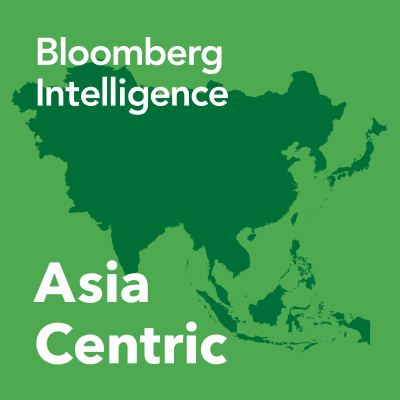
Asia Centric by Bloomberg Intelligence
Englisch
Gratis en Podimo
Kostenlos hören bei Podimo
Starte jetzt und verbinde dich mit deinen Lieblingspodcaster*innen
- Vertraut von über 1 Mio. deutschen Hörer*innen
- Über 1.000 lokale Podcasts und Shows – nur bei Podimo
- Keine Zahlung nötig
Mehr Asia Centric by Bloomberg Intelligence
Some of the world's largest and fastest-growing markets, economies and companies are in Asia. Every Thursday, John Lee from Bloomberg Intelligence and Katia Dmitrieva from Bloomberg News speak with experts and newsmakers about the big ideas and trends moving money across the region.
Alle Folgen
112 FolgenSoftBank's AI Gamble – Bold Vision or Risky Bet?
SoftBank is doubling down on artificial intelligence with a $30 billion commitment to OpenAI and ambitious plans for Stargate – even as risks mount. After a 200% surge earlier this year, shares tumbled 40% in November when Google’s Gemini 3.0 gained traction, threatening ChatGPT’s dominant position in the AI race. Credit stress is rising, with CDS widening to nearly 300 basis points as funding concerns build. Investors and creditors are increasingly uneasy as OpenAI now accounts for about 20% of SoftBank’s net assets, turning what was once seen as a bold growth play into a potential source of concentrated risk. Bloomberg Intelligence equity analyst Kirk Boodry and credit analyst Sharon Chen join John Lee on the Asia Centric podcast. Together they unpack SoftBank’s AI ambitions, its reliance on margin loans and the implications of circular financing. They also weigh up Masayoshi Son’s track record – spectacular wins such as Alibaba and painful failures like WeWork – against his latest AI gamble. See omnystudio.com/listener [https://omnystudio.com/listener] for privacy information.
2026 Lookahead for Stocks, Bonds and Currencies
It’s time to look ahead and make bold predictions for Asia in 2026. After a standout year, Asian equities are on track to beat the S&P 500 by the widest margin in eight years. Can the rally continue, and which markets will lead? Are investors overlooking US funding stress, potential QE, and the risks behind multi-decade tight credit spreads? And what’s next for Asian currencies and gold? Asia Centric convenes Bloomberg Intelligence strategists for a forward-looking discussion. Host John Lee is joined by Senior Equity Strategist Marvin Chen, Chief Asia FX Strategist Stephen Chiu and Senior Credit Strategist Timothy Tan as they unpack AI-driven growth, shifting currency dynamics, structural liquidity risks, and the potential repatriation of trillions in global capital back to Asia. See omnystudio.com/listener [https://omnystudio.com/listener] for privacy information.
Hong Kong Defies Global IPO Slump
Regulators around the world, from the US to Singapore and Australia, are trying to revive initial public offerings. The London Stock Exchange raised less than $2 billion since the beginning of 2024, its worst drought since 1998, while the number of publicly listed companies in the US has halved from 8,000 in 1996. Regulatory burdens, litigation risks and abundant private capital have pushed companies to remain private. Paul Atkins, chairman of the US Securities and Exchange Commission, has vowed to "make IPOs great again". But what can regulators do to entice companies to list? And why is Hong Kong bucking this trend – the city is on track to raise more than $40 billion this year and has a pipeline of more than 300 mainland Chinese firms seeking listing. Larry Tabb, Bloomberg Intelligence head of market structure research, and Sharnie Wong, BI senior analyst – diversified financials, joins John Lee on the Asia Centric podcast. See omnystudio.com/listener [https://omnystudio.com/listener] for privacy information.
Takaichi's Growth Agenda Collides With BOJ Policy
Inflation has returned to Japan after decades of near-zero price growth, with consumer prices rising close to 3% – the fastest since the 1980s. The cost-of-living squeeze, driven by food prices, helped topple the previous administration and propel Sanae Takaichi to power as Japan's first female prime minister. Her pro-growth, big government stance promises fiscal stimulus, but risks complicating the Bank of Japan's efforts to contain sticky inflation. Taro Kimura, Japan senior economist at Bloomberg Economics and Bank of Japan veteran, joins John on the Asia Centric podcast. He explains why inflation may be higher for longer and what Takaichi's policies mean for BOJ independence. He also covers the prime minister's remarks on Taiwan that sparked tension with Beijing, adding a geopolitical layer to Japan's economic challenges. See omnystudio.com/listener [https://omnystudio.com/listener] for privacy information.
Can Korea's World-Beating Bull Market Continue?
South Korea's Kospi Index has surged about 70% this year, driven by AI-linked tech stocks such as Samsung Electronics and SK Hynix. Retail investors, who poured more than $100 billion into US equities since the pandemic, are now turning their attention homeward. President Lee Jae Myung's pro-market and corporate governance reforms, including dividend tax cuts from 49% to a proposed 25%, are reshaping investor sentiment and capital flows. Peter Kim, managing director and investment strategist at KB Securities, joins John on the Asia Centric podcast. Kim discusses the sustainability of South Korea's rally, Seoul's overheated property market and the geopolitical balancing act between China and the US. See omnystudio.com/listener [https://omnystudio.com/listener] for privacy information.















































